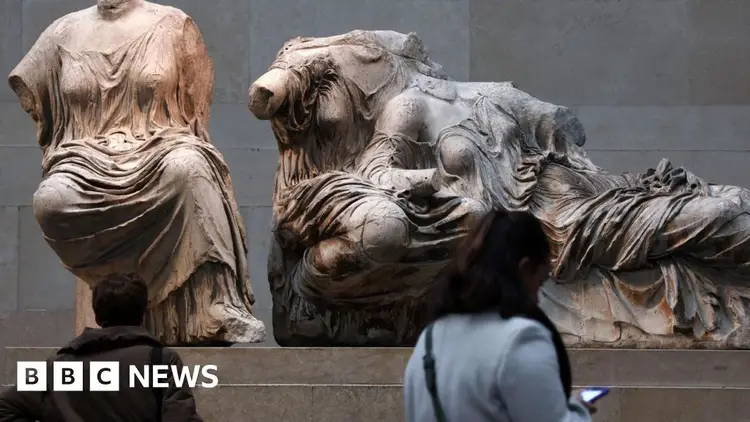Elgin Marbles: UK-Greece deal on Parthenon Sculptures 'close'

A former advisor to the Greek government told the BBC that an agreement to potentially bring the Parthenon Sculptures back to Greece is "nearly finalized."
Professor Irene Stamatoudi mentioned that it appears progress has been made in discussions regarding the relocation of the antiquities, commonly referred to as the Elgin Marbles. These artifacts were taken from Athens over 200 years ago and are currently housed in the British Museum.
This took place when Sir Keir Starmer met with his Greek counterpart for discussions at Downing Street on Tuesday, although Number 10 has stated that the topic is not part of their agenda.
A formal statement from Downing Street about the meeting did not reference the topic that was under discussion, although Greece's state broadcaster ERT reported that it had been addressed.
The meeting takes place as there are updates indicating that negotiations about relocating the statues to Athens have made significant headway.
The condition of the sculptures has been a point of diplomatic conflict between the UK and Greece for many years.
Greece claims that the items were taken unlawfully, while the British Museum maintains that they were acquired through legitimate means. Discussions between Greece and the museum have been ongoing since 2021.
Professor Stamatoudi, who provided guidance to the Greek culture minister during earlier discussions about the Elgin Marbles, informed BBC Radio 4’s Today show that she thinks "a deal is nearing." However, she expressed uncertainty about whether it's "close enough."
She mentioned that the Greek government has suggested a "cultural and strategic partnership." This would entail sending other ancient artifacts to the British Museum to occupy the space that would be left empty if any items were returned.
Discussions about what might be sent to the British Museum are kept confidential, according to Prof. Stamatoudi. Although she is not directly participating in this latest round of negotiations, she thinks it will likely include "artifacts that capture widespread interest."
Professor Statamoudi stated that the effort to bring back the antiquities is something that "all Greeks deeply care about," as these artifacts are viewed as integral to the nation's "cultural heritage."
Greek Prime Minister Kyriakos Mitsotakis has prioritized the effort to bring back the Elgin Marbles.
The situation led to a diplomatic conflict last year when then-Prime Minister Rishi Sunak called off a scheduled meeting with Mitsotakis after the latter suggested he would bring up the topic during their discussion.
The former government maintained that the sculptures ought to stay at the museum. In contrast, Labour stated that they would not obstruct a potential loan agreement between the British Museum and Athens if such an arrangement were to be made.
According to officials in Athens, Prime Minister Mitsotakis is interested in reconnecting with Starmer after their meeting in November 2023, as reported by Greek media.
Earlier this week, Greek government spokesman Pavlos Marinakis mentioned that Mitsotakis would bring up the topic again with Starmer, emphasizing that it's primarily an issue for the British Museum rather than the government itself.
He also refuted a Sky News report that stated there had been three private meetings between high-ranking Greek officials and members of the British Museum's board of directors.
When inquired about the possibility of returning the marbles, a spokesperson for Starmer stated, "The government's stance is that we do not intend to alter the law to allow for a permanent relocation. Decisions regarding the care and management of the sculptures are the responsibility of the trustees of the British Museum, which operates independently from the government."
It is believed that Starmer is more receptive to the idea of moving the statues compared to his predecessor, as long as an agreement can be reached between the Greek government and the British Museum.
The Elgin Marbles were created in the 5th century BC and were originally showcased in the Parthenon in Athens. They are regarded as some of the most valuable artifacts from Ancient Greece.
British nobleman Lord Elgin took them when Athens was under Ottoman control, and they suffered significant damage on the way to London, where they have been exhibited ever since.
A law enacted in 1963, known as the British Museum Act, prohibits the removal of items from the British Museum’s collection.
The officials of the British Museum are looking into the option of a unique loan agreement with Greece.
However, the Greek government has previously stated that it will not consent to a loan, as doing so would imply recognition of the British Museum's ownership of the sculptures.





























































